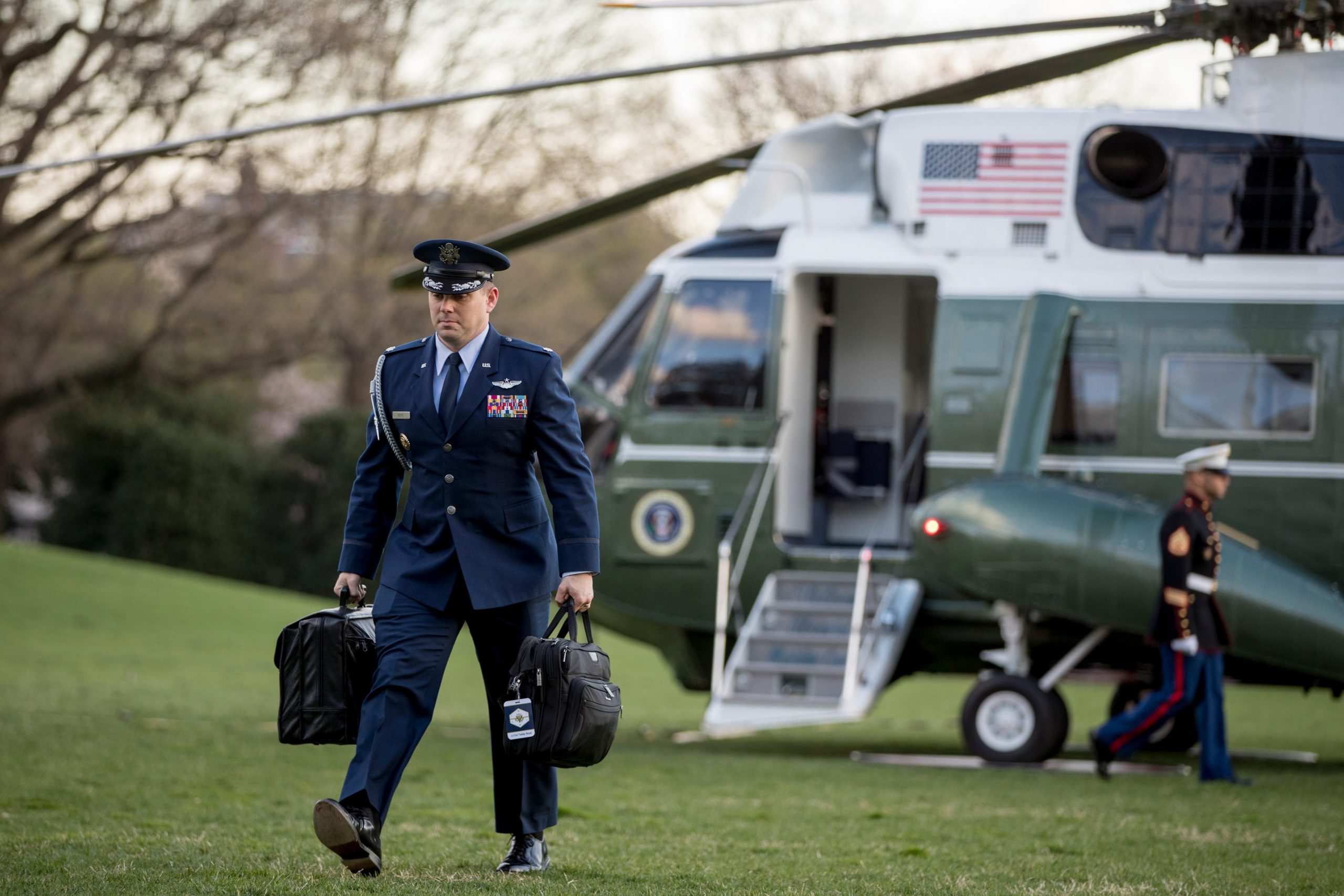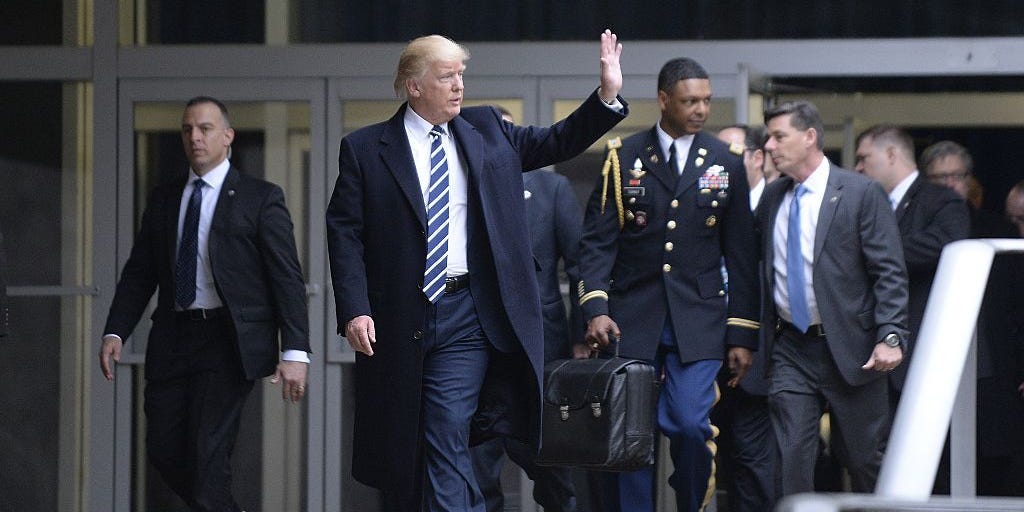
Photo by Olivier Doulier – Pool/Getty Images
- American presidents are accompanied by a military aide carrying a briefcase with the tools necessary for nuclear war.
- During presidential inaugurations, nuclear command authority and the so-called “nuclear football” are transferred to the new president.
- There is the possibility though that President Donald Trump may not participate in President-elect Joe Biden’s inauguration, potentially complicating the transfer.
- The Pentagon said there is a plan for the transfer in that scenario but declined to provide details. However, nuclear weapons experts and a former military aide who carried the football provided some insight.
- Visit Business Insider’s homepage for more stories.
An important yet discreet part of the inauguration of a new president is the transfer of command and control authority over the US nuclear arsenal, but there is the possibility President Donald Trump will not attend President-elect Joe Biden’s inauguration, potentially complicating matters.
Trump has refused to say whether he will attend Biden’s inauguration, but multiple reports have suggested that the president will skip the swearing in of his successor and hold a political rally elsewhere instead.
So, what happens to the nuclear football that accompanies the president if Trump doesn’t show? How does it get to Biden?
“That’s a good question,” Hans Kristensen, a nuclear weapons expert at the Federation of American Scientists, told Insider. “It is an unprecedented situation.”
The president has sole authority to conduct a nuclear strike, and wherever he goes, he is accompanied by a military aide that carries a briefcase called the “president’s emergency satchel,” more commonly known as the “nuclear football.”
Every president since John F. Kennedy has been accompanied by the aide carrying the hefty briefcase, which gives them the ability to command US nuclear forces when away from physical command and control centers.

AP Photo/Andrew Harnik
The briefcase does not contain a button that can instantly unleash hundreds of nuclear warheads deployed on intercontinental ballistic missiles, submarine-launched ballistic missiles, and strategic bombers. Instead, the briefcase contains communication tools, codes, and options for nuclear war. The US is estimated to have 3,800 nuclear weapons in its stockpile, second only to Russia.
Separate from the football, presidents carry a card, sometimes called the "biscuit," on their person containing authentication codes. In a nuclear conflict, the president would use the codes in coordination with the tools in the football to identify himself to the military and order a nuclear strike.
Incoming presidents are typically briefed on their nuclear responsibilities prior to taking the Oath of Office. Then, during the inauguration, the codes they received that morning or the day before become active and control of the football is quietly and seamlessly passed to the new president.
Trump described that moment as "sobering" and "very scary," telling ABC News in 2017 that "when they explain what it represents and the kind of destruction that you're talking about, it is a very sobering moment."
The transfer of the nuclear football is supposed to occur at noon as the new president is sworn in. The military aide who has been carrying the briefcase hands it off to the newly designated military aide, former Vice President Dick Cheney said in a past Discovery documentary. This traditionally happens off to the side and is not a part of the show.
If Trump is not at the inauguration, then the transfer process will be different. Still, the transfer will need to be instantaneous, explained retired Air Force Lt. Col. Buzz Patterson, who carried the football for former President Bill Clinton.
"That's the way it has to be," he told Insider. "For the process to work, you have to have this clear handing off of responsibilities." He said that how that happens will be up to the Pentagon, which serves the office of the commander-in-chief, not the man.
A Pentagon spokesperson told Insider that the Department of Defense has a plan for the transfer on inauguration day but declined to provide any further details.
"We war game this stuff and we practice it ad nauseam for years and years," Patterson said. "There are systems in place to make sure that happens instantaneously. There won't be any kind of question about who has it, who is in charge at that point in time."
"We don't take this stuff lightly," he added. "There won't be any kind of hiccup. It'll just go down without anybody even noticing, which is what is supposed to happen."
Kristensen, the nuclear weapons expert at FAS, speculated that the plan could resemble plans in place for situations in which a president is suddenly killed or incapacitated, situations in which nuclear command and control authority and all accompanying equipment has to be immediately transferred to the vice president or another designated survivor.
Stephen Schwartz, a nonresident senior fellow with the Bulletin of the Atomic Scientists, recently discussed with the Center for Arms Control and Non-Proliferation what would happen to the nuclear football if Trump does not attend the inauguration.
Schwartz, known for his research on the nuclear football, explained that there is actually more than one football. In fact, there are at least three of them - one for the president, vice president, and a designated survivor.
He said that if another nuclear football has not already been prepared, one likely would be before inauguration. There would be a military aide ready then to begin following Biden as soon as he is sworn in. And, at that time, Trump's nuclear command and control authority would expire.
"Hopefully President Trump will be there and it will be just a handoff, which is what it's been for decades," Patterson said, adding that if he doesn't though, "it's not that big of a deal" because the military will make sure that the transfer occurs as needed.

